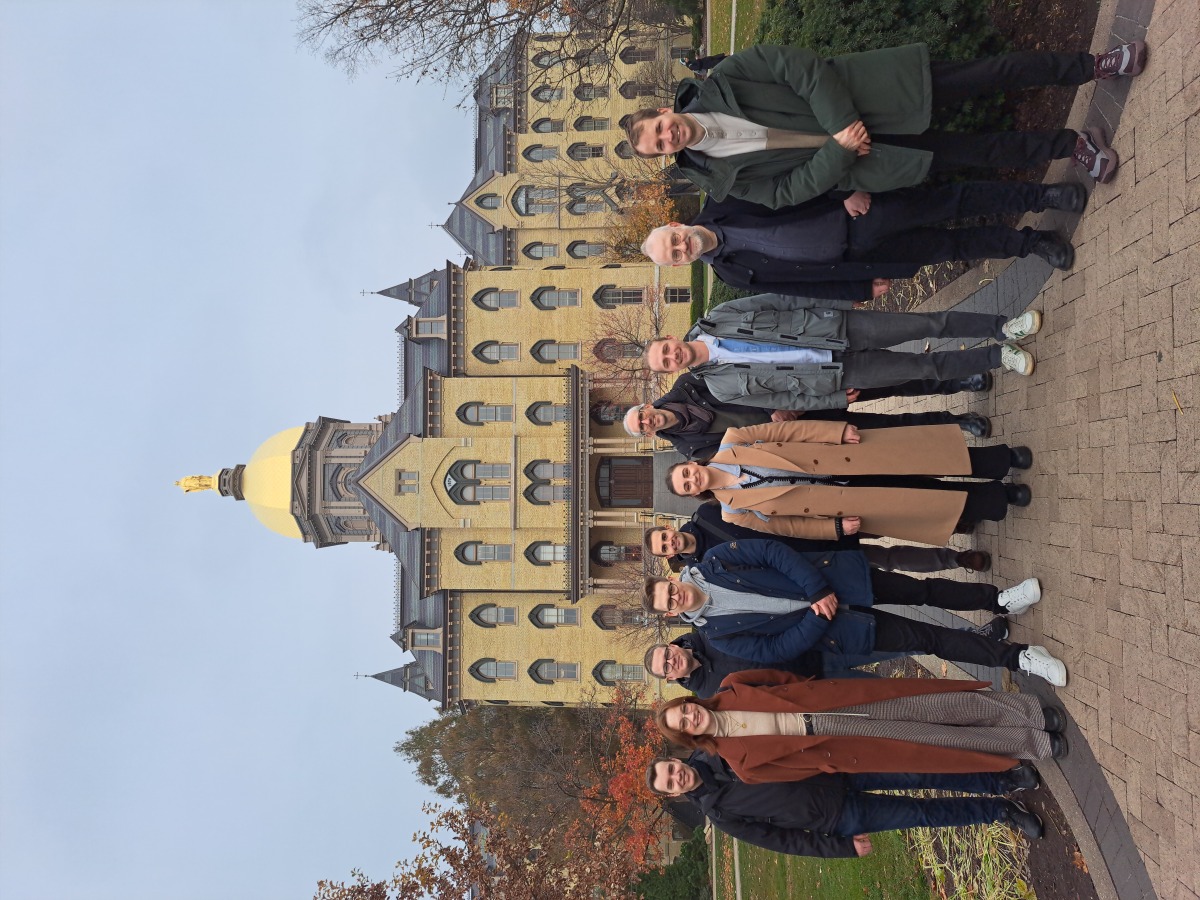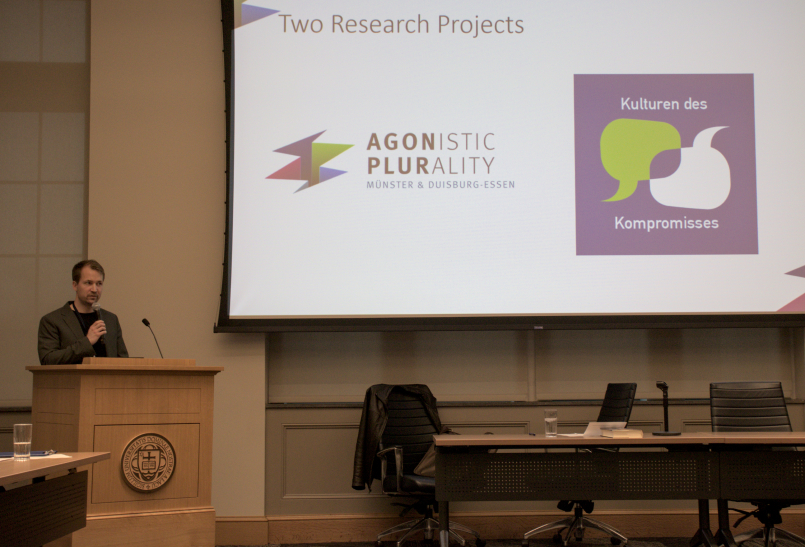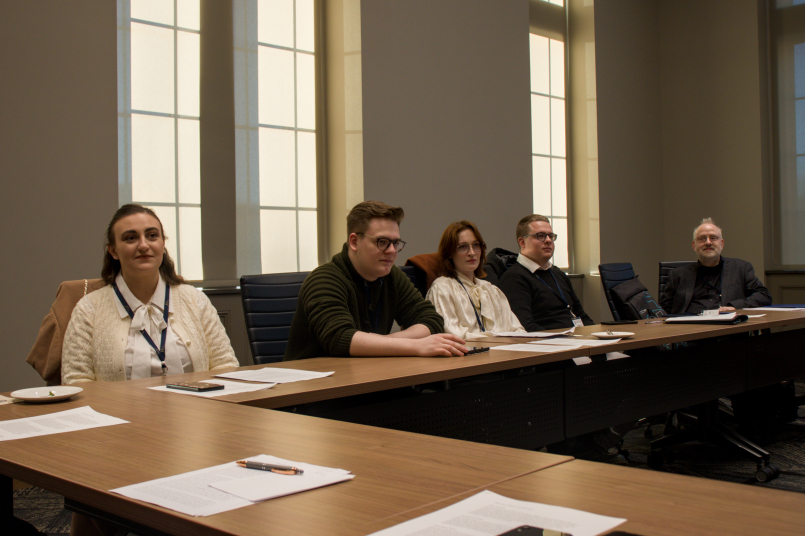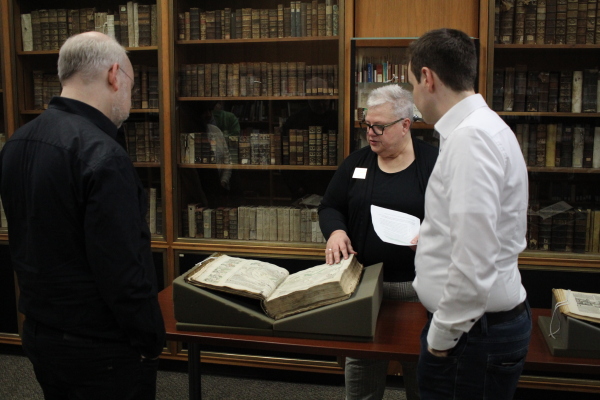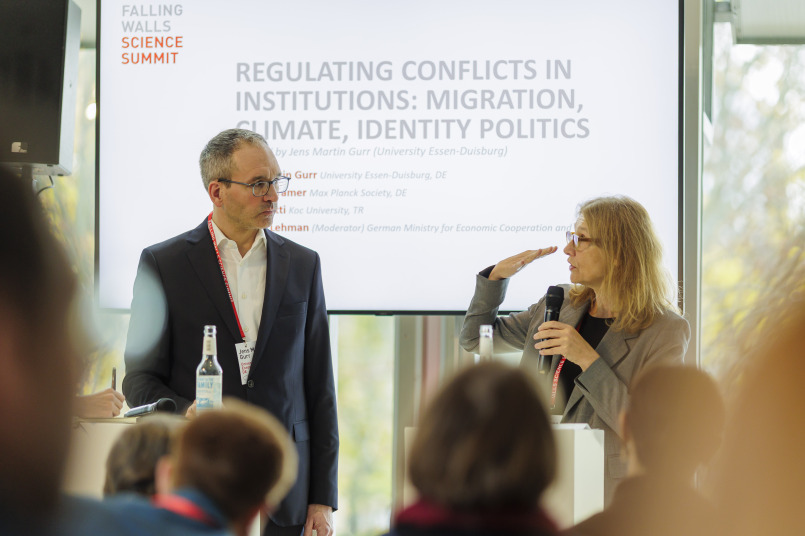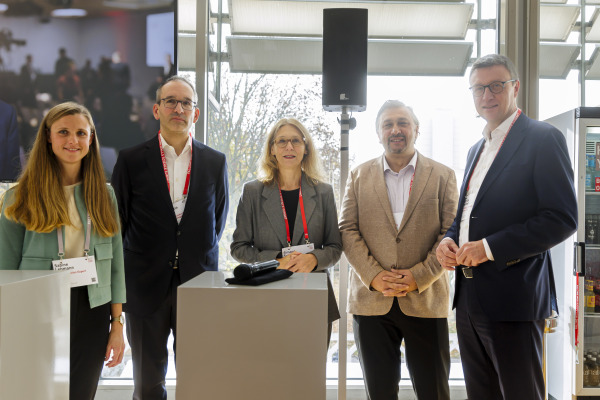Research Network "Cultures of Compromise"
Events & Information

Interview on Coalition NegotiationsCompromises after the Bundestag Election
Project leader Prof. Dr. Ulrich Willems gave an interview to the German TV channel 3sat on the role of compromise in the upcoming coalition negotiations after the federal elections. He explains how the parties' demands, which were expressed very sharply during the campaign, can be negotiated together. The political scientist from the University of Münster also emphasizes with regard to the public:
"We need a culture of conflict and we need a culture of compromise. This is essential for democracy."
End of YearThis was 2024
An eventful and insightful year has passed, during which members of the project were able to share their knowledge in many ways – through lectures and interviews, or at conferences and workshops. Above all, the political developments of recent weeks have shown: compromises are a pressing political topic and will remain so for the foreseeable future. This became evident not only on a national level but also in exchanges with researchers and students from the United States, whom a group of project members met in November 2024 during a masterclass at the University of Notre Dame.
All this work was only possible thanks to the excellent work in a team, which also saw some changes. Julia Mariko Jacoby took up a position in Japan, while Elisabeth Haefs left after a brief but productive time with us. We thank them for the great collaboration and wish them all the best for the future.
International NetworkingMasterclass at the University of Notre Dame
From November 17 to 21, a master class for current and former research students of “Cultures of Compromise” took place at the University of Notre Dame in the USA. Following an invitation from Prof. Dr. William Donahue, Professor of German Literature and Film and the European Studies Program, Benjamin Hassenflug, Ernst Beneke Krumme, Lisa Olbering, Pavlos Leußler, Stefan Pulte, Bithleem Maria Sagiroglou and Andrew Wittenbrink travelled to the internationally renowned university in the state of Indiana. They were accompanied by postdocs Dr. Tobias Albrecht and Dr. Jan-Hendryk de Boer as well as Dr. Mark Halawa-Sarholz, Managing Director of the College for Social Sciences and Humanities in Essen. The aim of the trip was to present the College's research work in Notre Dame and at the same time to give the students their first experience of international academic life.
The group was warmly welcomed to Notre Dame by William Donahue. As their host, he had put together a program that was as challenging as it was varied. One focus was on attending courses in various disciplines. The students were able to attend seminars and lectures according to their interests and thus gain an impression of teaching at a North American university. One group actively participated in a German studies course taught by William Donahue and was thus able to pass on their native language knowledge to the students. The academic highlight of the Masterclass was the presentation of the project's research results by the students and postdocs on November 19. The group was able to provide insights into the multifaceted work of “Cultures of Compromise” and the “Agonistic Plurality” research project: First, the guiding questions and central methodological and theoretical approaches of both projects were outlined, followed by presentations of individual studies. The presentation ranged from research into the history of the term and the concept of 'compromise' in the pre-modern and modern periods, to the presentation of the international conferences and workshops that have been held to date, to the presentation of Bachelor's and Master's theses and doctoral projects that have emerged from the research projects.
The topics and questions of the research project met with great interest from academics and students alike. One reason for this is certainly the political situation in the USA: following the re-election of Donald Trump, the question of what role compromise can and should play in today's democracies is becoming increasingly urgent. Is the decreasing willingness to compromise a threat to democracy and society? How can politics function if key players are not prepared to compromise on their positions? When and under what circumstances do political and social debates reach a level of agonality, of profound dissent, that becomes threatening? What possibilities are there for regulating such dissent, if not resolving it, in order to prevent a potentially violent escalation?
Both projects have been researching all of these questions in recent years, addressing precisely those problems that are currently preoccupying people in the USA. The discussions were correspondingly intense, both in terms of content and day-to-day politics. Not least because the University of Notre Dame has responded to these challenges with its own priority program on democracy education, there were numerous points of contact to discuss further cooperation. All in all, it was an exciting and rewarding trip with many new insights for everyone involved.
A report by Jan-Hendryk de Boer
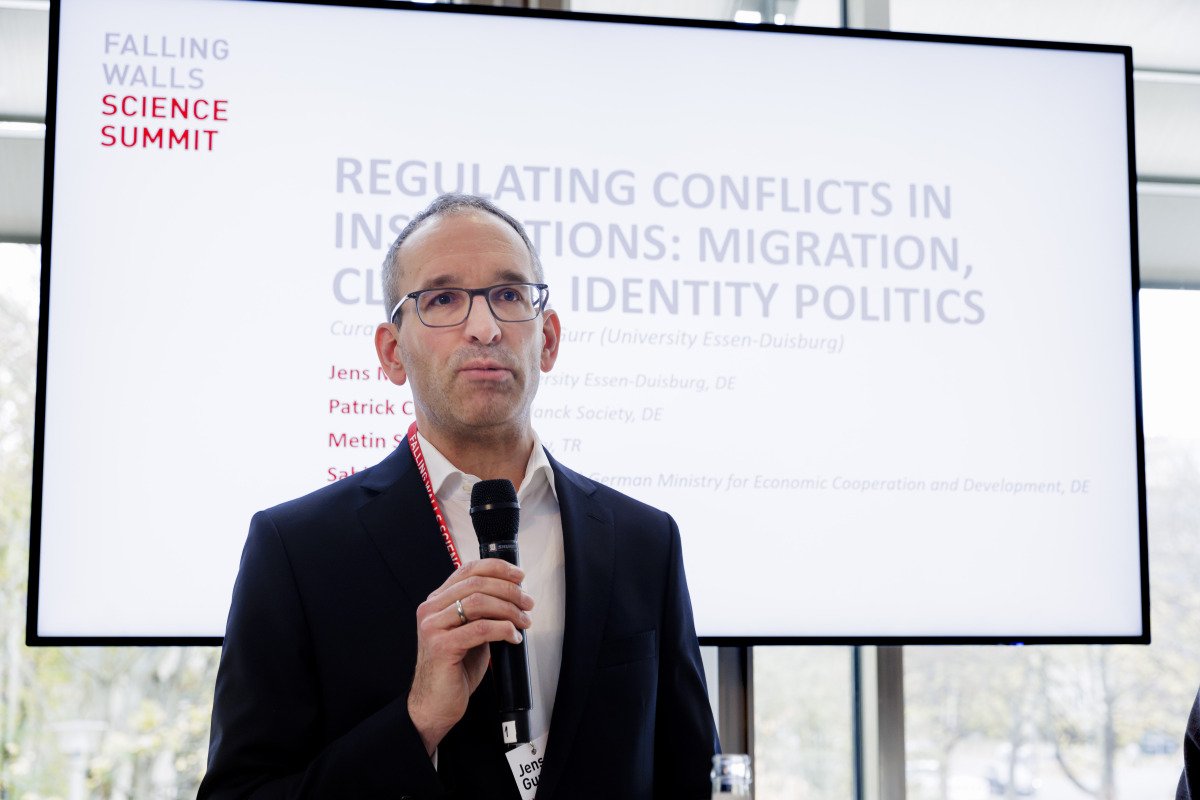
Falling Walls Science Summit in BerlinProf. Jens Gurr discusses Conflicts in Institutions and Plural Societies
At the "Falling Walls Science Summit" in Berlin (November 7-9, 2024), Prof. Jens Martin Gurr participated in a panel on "Regulating Conflicts in Institutions: Migration, Climate Change, Identity Politics". Moderated by BMZ communication expert Sabine Lehmann, the panel included Prof. Patrick Cramer (President of Max Planck Society), Dr. Simone Schwanitz (Secretary General of Max Planck Society) and Prof. Metin Sitti (President of Koç University, Istanbul). The panel discussed ways in which institutions can handle the key present-day conflicts arising in present-day plural societies in ways compatible with democracy and so as to safeguard the continued functioning of these institutions. Prof. Gurr, who had been asked to provide the opening input, here introduced key concepts from the two collaborative projects "Cultures of Compromise" and "Agonistic Plurality".
Public lecture (20 November 2024)Prof James N. Green (Brown University): “Brazil’s Long Struggle: Dictatorship, Conflict, and the Challenges of Plurality”
In a lecture on November 20, 2024, the historian James N. Green, shared his knowledge of Brazil's history since the 1964 military coup and its ongoing impact on the country’s political landscape. The focus was particularly on agonal pluralities – not only within opposing political camps but also within the opposition to the dictatorship itself, which was notably shaped by the ‘Generation 77’.
After the 1964 coup, political freedoms were restricted, and opposition movements were forced to organize in secret. In the 1970s, a group of dissidents known as the ‘Generation 77’ became well-known. LGBTQI+, feminist, and Black groups sought political freedom and raised new social questions about societal plurality – opinions that, however, drew criticism from the Marxist opposition, accusing them of causing division within the resistance movement.
Although these debates took place more than 40 years ago, they remain relevant today. They have resurfaced in discussions about the Workers’ Party's electoral strategies, as the party navigates the tension between defending progressive values and attempting to win back its former traditional voter base, which has shifted to the right. The lecture and discussion therefore focused on approaches to pluralism, as well as the reasons behind the rise of Bolsonarism and the far-right, and how these threats to Brazilian and international democracy can be addressed – for example, through initiatives like the Washington Brazil Office.
Conference (19-21 September, Darmstadt)“Democracy and Compromise: The Political in Groups, Committees, and Teams”
The Schader Foundation is organizing a conference in cooperation with the University of Münster, the research project ”Cultures of Compromise”, and the German Society for Group and Organisational Dynamics (DGGO). The conference is called ”Democracy and Compromise: The Political in Groups, Committees, and Teams”. Further information can be found here and in the conference programme.
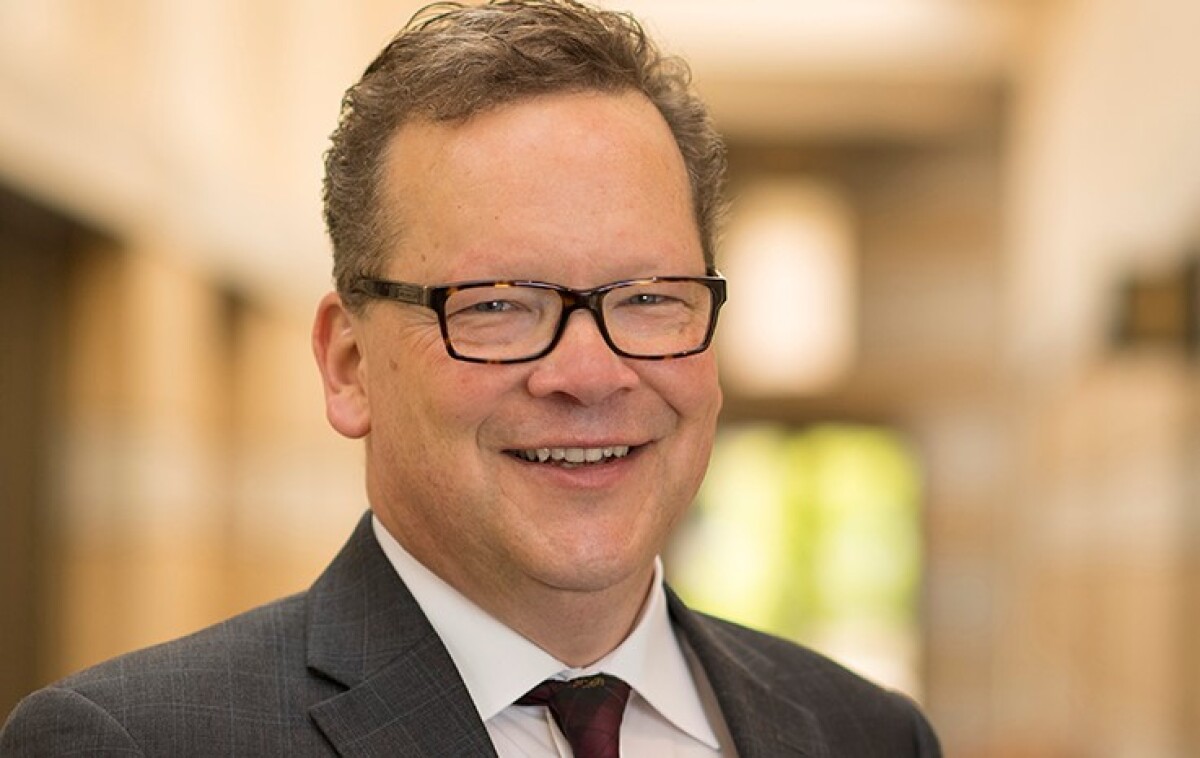
Welcome to Prof. William Donahue (University of Notre Dame, Indiana)
From May to July 2024, Prof. William Collins Donahue will be a Visiting Fellow at the “Cultures of Compromise” research network and the “Agonistic Plurality” project.
Prof. Donahue is Cavanaugh Professor of the Humanities at the University of Notre Dame in Indiana, USA. His research interests at the College of Arts and Letters include German Studies, Contemporary European Studies, Holocaust Studies, and German Jewish Studies, among others. Prof. Donahue has visited the University of Duisburg-Essen several times and he is the founding co-editor of the yearbook “andererseits: Yearbook of Transatlantic German Studies” together with Prof. Georg Mein and Prof. Rolf Parr.
Contact: William.C.Donahue.36@nd.edu
Recently published:
- Bystander, Pundit, Critic, Activist: Erich Kästner as Political Thinker. On Erich Kästner. Resignation ist kein Gesichtspunkt. Politische Reden und Feuilletons, ed. with an afterword by Sven Hanuschek. Review Essay. Arbitrium (Heft 42/1); spring 2024.
- ‘Now Comes the Reckoning’ | Commonweal Magazine October 31, 2023.
- Donahue WC. "Wie wir es heute mit der Religion halten. Liebe und Liebesgeschichten als Antwort auf die Gretchenfrage – eine Untersuchung zu Goethe und Honigmann." Psychiatrische Praxis. 2023 Jul; 50 (S 01): S49-S54. German. doi: 10.1055/a-2055-8875. Epub 2023 Jul 10. PMID: 37429283.
- “Pictures that Hold Us Captive: A Rumour of Transcendence in Barbara Honigmann’s Bilder von A.,” in: Robert Gillett and Godela Weiss-Sussex, eds., Barbara Honigmann. (Bern: Peter Lang, 2023): 149-76.
- "'There is such a thing as good realism': The Not-So-Secret Afterlife of Modernism in Baßler's Popular Realism." Review of Moritz Baßler, Populärer Realismus. Vom International Style gegenwärtigen Erzählens. Arbitrium, vol. 41, no. 2, 2023, pp. 237-43. https://doi.org/10.1515/arb-2023-0029
Conference (4-6 July 2024, London)“Cultures of Compromise and Liberal Democracy after the Second World War”
Prof. Dr Constantin Goschler organizes a conference at the German Historical Institute (London) from 4-6 July 2024. The conference is organized by the German Historical Institute and the London School of Economics, as well as the Gerda Henkel Foundation.
March 2024Interview with Prof. Dr Ulrich Willems in “Le Figaro”
The French newspaper Le Figaro has published a commentary concerning the current status of practicing compromise in German politics. The article is based on an interview between the journalist Pierre Avril (Le Figaro correspondent in Berlin) and Prof. Dr Ulrich Willems. The article is available here (French language).
Joint Institute of Conflict Analysis, Conflict Regulation and Civic Education (Concrede)
The Joint Institute of Conflict Analysis, Conflict Regulation and Civic Education (Concrede) was established by the Universities of Duisburg-Essen and Münster in 2023. Its aim is to bring together various research projects and individual academics from both universities who are involved in researching conflicts in pluralistic societies and to provide a forum for cooperation. The “Cultures of Compromise” research network is also represented by Concrede.
March 2024Blog post on “Compromise in Plural Worlds: A Comparison of Japan and Europe”
The translator Ursula Gräfe (Frankfurt) held a lecture on forms of compromise in Japanese literature during the workshop “Compromise in Plural Worlds: A Comparison of Japan and Europe” on 7 March in Essen. You can find a report of her lecture on the literature blog Bücheratlas (author: Martin Oehlen).
International Workshop (7-8 March 2024)“Compromise in Plural Worlds. Japan and Europe in Comparison”
Organisation: The conference was organised by the research project “Cultures of Compromise” and the “Agonistic Plurality” project based at the Universities of Duisburg-Essen and Münster.
Responsible for the conference: Jan-Hendryk de Boer, Julia Mariko Jacoby, Elisabeth Haefs (University of Duisburg-Essen) and Manon Westphal (University of Münster)
The workshop “Compromise in Plural Worlds. Japan and Europe in Comparison” on 7 and 8 March 2024 in Essen dealt with forms of conflict regulation in Japan's history and its present-day society. In particular, the role of compromise in Japan, a society where consensual agreements are highly valued and open conflict is not welcome, was discussed. A comparison with Europe also focused on working out specifics and commonalities. Interdisciplinary researchers from Tokyo, Hiroshima, Osaka, Leiden, Sheffield and Frankfurt am Main held lectures during this workshop.
The public lecture on 7 March 2024 was given by Prof. Dr Masaki Taguchi (Legal History, University of Tokyo).
February 2024Panel Discussion: “Peace. Pluralism. Open Societies: Dealing with Religious Diversity” in Münster
In the context of an interdisciplinary panel discussion, political scientist Dr Manon Westphal gave a lecture on compromise in Münster. Exactly 375 years after the ratification of the Peace of Westphalia, the City of Münster and the University of Münster invited interested citizens and academics to an interdisciplinary discussion to talk about the links between peace and pluralism. The central topic of the event was how to deal with religious diversity.
January 2024Daniel Bar-Tal: Public Lecture and Book Presentation
From 22 to 25 January 2024, Prof. em. Daniel Bar-Tal, PhD (School of Education/Tel Aviv University) presented his new monograph at the University of Münster and held a workshop at the University of Duisburg-Essen, offering further exchange concerning his research. He also offered students the opportunity to engage with him and his research in a two-hour masterclass at the University of Münster.
Daniel Bar-Tal is distinguished for his research on the socio-psychological foundations and dynamics of intractable conflicts. Furthermore, he developed a conceptual framework for understanding children's political socialization and for peace education. He is concerned with the Israeli-Arab-Palestinian conflict and has presented comprehensive socio-political psychological analyses of its emergence, persistence and maintenance. He gave his lecture on this topic in Münster, which was well attended and also followed online via livestream. In his lecture, he not only described the core theses of his current book, but also explicitly referred to the current war in the Middle East. The lecture was followed by an intensive and lively discussion.
Daniel Bar-Tal's visit in January was hosted by the research network “Cultures of Compromise” and the “Agonistic Plurality” project at the Universities of Münster and Duisburg-Essen.
Bar-Tal, Daniel. Sinking Into the Honey Trap: The Case of the Israeli-Palestinian Conflict. Trans. Barbara Doron. Washington, DC: Westphalia, 2023.
Otober 2023Public Lecture with Martin Kobler: “Compromise at any cost?” An Account of Practical Experience
26 October 2023, 6:00 p.m.,
College for Social Sciences and Humanities (Lindenallee 39/41, 45127 Essen)
In his lecture, former diplomat and ambassador Martin Kobler provided insights into dealing with compromise in the diplomatic service. He emphasised one of the most important characteristics of conflict resolution: without a shared vision, without a consensus concerning the compromise, a solution cannot be sustainable.
During his distinguished career, Kobler has served as the UN special envoy to Libya (2015-2017), as well as to Afghanistan (2010-2011), Iraq (2011-2013), and Congo (2013-2015). Most recently, he was the German Ambassador to Pakistan (2017-2019). Since 2020, Kobler has been a guest lecturer at the Bundeswehr Command and Staff College in Hamburg.
Interview with Jonathan FloydPublic Political Philosophy and Its Uses for Thinking About Compromise
In his lecture on May 10, 2023 on “Public political philosophy in theory and practice“, Dr Jonathan Floyd (University of Bristol) presented his approach to public political philosophy. It addressed the question of what it means to do political philosophy not only for the academic sphere, but also for the general public
Mathis Knospe, a student in Comparative Public Governance and European Studies at the University of Münster and a student assistant in the research network “Cultures of Compromise“, met Jonathan Floyd for an interview.
You can find the full interview here.
International Conference of the association “Cultures of Compromise”
In three keynote lectures and twelve presentations, the phenomenon of compromise will be examined from theoretical and a historical perspektive.
Programme details and further information about registration can be found here.

May, 2023Article “Cultures of Compromise in Britain and Germany after 1945” published
The German Historical Institute London published “The Genius of Parliament: Cultures of Compromise in Britain and Germany after 1945” - Bulletin GHIL, vol. 45 (2023), no. 1, 3-38 - by Prof. Dr Constantin Goschler.

June 2022Radio Interview
During the opening event, our team member Stefanie Segieth interviewed personal investigators and scientists for CampusFM Radio at the University of Duisburg-Essen.




